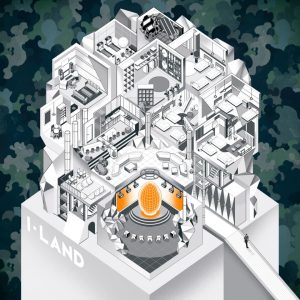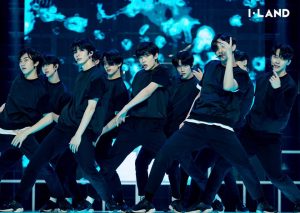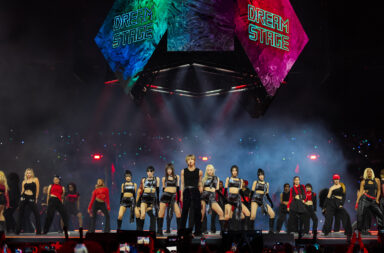
Even for those who didn’t watch it, the impact of Mnet’s Produce series on the idol industry is hard to ignore. Every year since 2016, the survival competition show distilled approximately 100 trainees from a multitude of companies down to their elite, birthing groups that went on to become hugely successful in a saturated industry – I.O.I, Wanna One and Iz One. In 2019, a voting manipulation scandal brought the series (and its final group, X1) to a premature end, and as the sun set once and for all on Produce 101, a sizeable gap was left in the market for a replacement idol survival show – one that can offer viewers something new, while also continuing Produce’s legacy of idol reality TV that is both entertaining and compelling.
It’s in this context that I-Land, Mnet’s latest venture into idol reality TV, has made its first steps. Like many shows that have come before it, I-Land is a survival show pitting a number of pre-selected trainees against one another to compete for limited spots in a debut line-up. Unlike its predecessors, however, it has the backing of arguably the most successful entertainment agency of our time – Big Hit Entertainment, the label behind global faces of K-pop, BTS. To be specific, the show is a collaboration between Big Hit and CJ E&M, the company that owns Mnet, created through their new joint company, Belift Lab.
Unfortunately, the show’s first half, which ended last Friday, leaves a lot to be desired. One might expect that the collaboration with Big Hit, a well-respected company with a fairly savoury image, would translate into a softer style of reality TV, less focused on creating drama than it is on great music and performance, as well as teamwork and chemistry à la Bangtan TV. However, if anything, it’s the opposite; Mnet’s signature taste for melodrama is as prevalent as ever, repeatedly manifesting as unpleasant moments of tension and awkwardness created through cruel game rules or over-dramatic editing (or both).
While watching, The Hunger Games comes to mind as the most obvious source of inspiration for the show’s concept. 23 contestants aged between 14 and 22 arrive at the “I-Land”, a grandiose, purpose-built complex located in a fantastical forest that is designed to be the ultimate training facility for idols (but which looks and feels more like a dystopian prison). Here, they will train and compete for the chance to debut, through performances that are judged by a panel consisting of Big Hit’s CEO, Bang Sihyuk, and mentors Rain and Zico, among others.
There are two key elements that differentiate this show from others. The first is that trainees are divided into two factions: twelve I-Landers, who can stay in the opulent I-Land complex and who represent the elite, and eleven Grounders, who are the inferior faction and thus are relegated to a visibly more spartan building named the “Ground”. For fans of The Hunger Games, this strikes a pretty clear parallel; in the series, the Capitol, the city of rich and powerful, is contrasted against District 12, the most impoverished and undesirable area of the country. Trainees can be promoted or demoted at each stage of the competition, depending on their performance, but the maximum number of I-Landers remains twelve.

The second is that the trainees decide many of these demotions themselves. From the very first unit performances–where trainees publicly voted for the first set of I-Landers–to the most recent “Final 12” round–where the current I-Landers had to send three of their own to the Ground to undergo global voting and therefore risk complete elimination–I-Land has left an unusual amount of power to the teenagers themselves. While interesting, this has resulted in more than a few awkward situations, with trainees constantly second-guessing one another and unable to relax for fear that they will become a target for elimination. This is coupled with an odd, security-camera style of observation reminiscent of Big Brother, complete with bonus real CCTV footage that is available on the website.
All this makes for a distinctly uncomfortable watching experience. Tensions escalate to the point of being palpable, and yet a bout of drama will suddenly cut to a scene showing some endearing interactions happening between trainees. These light-hearted moments feel contrived; unlike the Produce series, humour takes a backseat in I-Land in favour of intense, serious competition, and so moments like these that are wedged in seem forced and hard to believe.
On the flipside, there is an abundance of tears, and yet a strange disconnect between the emotions of the contestants and the audience makes it difficult to empathise at many of these times. Perhaps it’s a lack of nuanced storytelling regarding individual trainees’ struggles, or the fact that the trainees weren’t differentiated well early on. Or, perhaps it’s just the simple fact that a lot of these tearful outcomes are produced by the trainees’ actions themselves, through voting and in-group drama. Either way, emotional attachment to trainees has been unusually hard to form so far in the series, which is unexpected considering it was what Produce did best.
The overall result is somewhat Lord of the Flies – devoid of adult supervision (except for the occasional meeting with the mentors), the group decide everything themselves, from choosing a leader, to learning the choreography, to choosing who to eliminate. Mnet toys with their loyalties, flip-flopping between rules that emphasise teamwork at times and individual performance at others. As teenagers who don’t necessarily have the emotional maturity to not fall for Mnet’s mind games, watching politics emerge both between and within the I-Landers and Grounders, for mostly arbitrary reasons imposed by the gamemaster, is perhaps the most unpleasant thing about this series so far.
It’s hard to imagine how a group created from teens who have had to play such a game as this can really build the solid bonds of friendship needed to excel in the industry. It’s a far cry from what BTS (whom many of the trainees idolise) stand for, which is teamwork, friendship, brotherhood and, above all, an unyielding belief that the whole is greater than the sum of its parts. Even if what we see in the show is wholly an illusion and the boys are actually the best of friends, audiences have not yet seen what they need to believe that the group I-Land forms will truly be better together than apart.

While there are additional criticisms that could be made about the dull stage effects, the lack of interesting song arrangements and impactful original songs, as well as the dreary design of the whole complex, on the whole, I-Land should be commended for pushing the boundaries of the genre and truly attempting to innovate and refresh an overdone format. However, as the show moves into its second half, where BTS will make a long-awaited guest appearance and the final 12 will jostle for positions in a group that could well define the next generation of K-pop, Mnet would do well to bring things back to what they do best: uplifting and compelling storytelling that takes talented youths on a meaningful journey of growth and brings the audience along with them.


